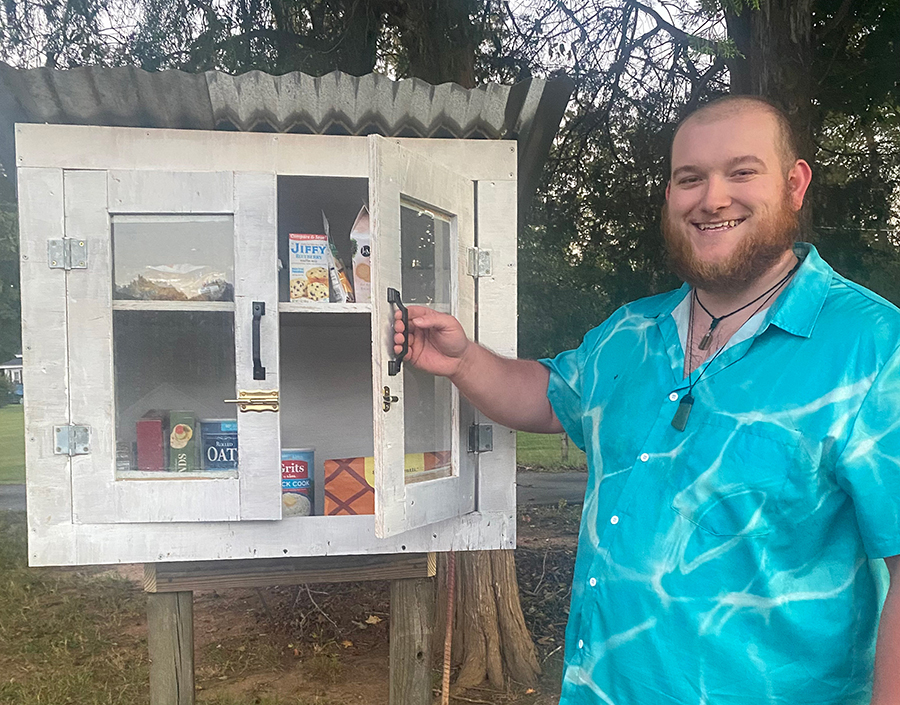Helping the Hungry: ABSN Student Builds Food Pantry for NC Church
Grayson Mangum remembers the heartbreaking conversation he had with his fiancée, Fiona, last spring. She was working as a student teacher in Guilford County, N.C., when a disabled student came into the classroom upset, curled into the fetal position and cried out, “Hungry!” That student wasn’t alone. Several other students in the class also struggled with food insecurity, his fiancée explained.

“Knowing not only that there are people out there facing food insecurity, but especially those with disabilities broke my heart and made me want to put thought into helping those facing food insecurity,” said Mangum, who is studying to earn an ABSN at the Duke University School of Nursing.
Moved by his fiancée’s story, Mangum decided he wanted to create a food pantry at his parents’ church Friendship Baptist in Level Cross, NC, to help local families who needed food. His idea finally materialized while taking a class, Wellness and Health Promotion Across the Lifespan, taught by DUSON Associate Professor Amie Koch.
As part of the class’s early clinical experience, students were asked to volunteer in a community program that promotes nutrition security for those who are food insecure, such as handing out hot meals or working at a food pantry. Mangum wanted to do something a little different and build the mini food pantry for his parents’ church that he had been dreaming of. But first, he needed to get his professor’s permission.
“Grayson sent me an email with an idea he had and wanting to know if I would allow a slightly different experience,” Koch said. “Grayson unintentionally applied the Nursing Process (Assessment, Diagnosis, Plan, Implement, Evaluate = ADPIE), which is every nursing professor’s hope for their nursing student. This ingenuity is something that is so important for nurses and such a beautiful moment for nursing professors to get to see in action.”
With his professor’s blessing, Mangum got approval from the church members and gathered plywood, aluminum, windowpanes and more items to begin building the mini pantry, or “blessing box,” as it has come to be known.
“A pantry that was safe, private, well stocked, and knowing that there are people who care about you somewhere was my thought and goal,” Mangum said. “The church was so ecstatic, in fact, that the ladies’ group at the church decided to adopt the stocking and maintenance of the mini pantry.”
He strategically placed the pantry at the church where it could be seen from the road but far enough away to provide some privacy for those needing its contents. Inside, people could find food, diapers, paper towels and more.
“My goal in building the blessing box was never to receive any sort of recognition or attention,” Mangum said. “Food insecurity is a major problem in this country. I believe that the solutions to these problems are grass-root level and can be done within communities.”
A Father’s Diagnosis, a Son’s Career
Mangum’s path to helping others and studying nursing at Duke began when he was 6 years old, when his father was diagnosed with a congenital heart defect. By age 12, he had watched his father undergo several surgeries and finally a heart transplant.
To become more comfortable with the problems his father was facing, Mangum began asking questions and learning as much as he could during the hospital visits. He was especially fascinated with the nurses and how skillfully they cared for his father, so he decided to follow in their footsteps.
“They were there every step of the way, and the quality of care that he experienced and that I saw were second to none,” Mangum said. “I knew that my place was within healthcare. Nursing just stood out to me as the one who gets to interact with the patient the most and makes the most difference in the patient’s stay in the hospital.”
After earning a Bachelor of Science at High Point University, Mangum decided to enroll at Duke University School of Nursing, the top nursing school in the nation. At first, he was fairly quiet in class, his professor recalled. But since completing the food pantry, he has blossomed and even received applause from his class after sharing his project.
“I saw him open up more in class. He started to raise his hand more and share, and I am so glad he did,” Koch said. “Grayson has such amazing and helpful input that makes the class discussion richer. Students like Grayson are what make DUSON such a dynamic place to teach.”
“My advice for him is to keep promoting health in his community, and most importantly, to keep raising his hand and speaking up and sharing his valuable knowledge,” she added.
Mangum is grateful to Koch and all of his professors for guiding him. He still isn’t sure what direction he wants to pursue with nursing – research, leadership and advanced practice all appeal to him. But for now, he is focused on earning his degree from Duke – he plans to graduate in December 2024 – and eventually getting married and starting a family with his fiancée.
“I fully believe that coming out of any school as a registered nurse makes you highly sought-after. However, by graduating from DUSON, I will be an extremely sought-after nurse leader who is able to transform practices, treatments, policy, and most importantly, the lives of my patients,” Mangum said.
He has already transformed lives through his food pantry in Guilford County, and he hopes to continue helping others as a nurse.
“I hope that this story will inspire someone to take a measure to reduce a problem that we as a people face and know that we are only as successful, civilized, advanced and secure as the least fortunate among us,” Mangum said.